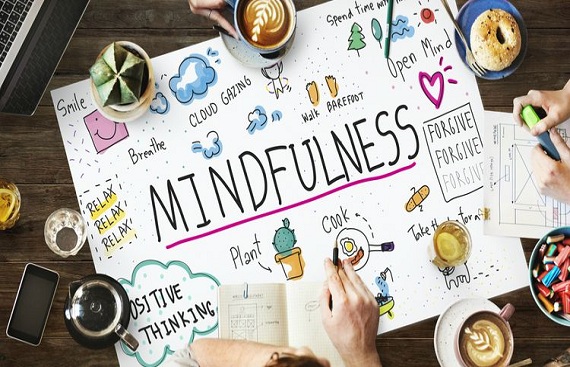Mastering Mindfulness for Reducing Stress & Increase Self-Awareness

Inner peace is what we all seek, but it may become elusive in the chaos of life, and stress is one of chaos we face, it’s actually a body's response to a perceived threat or challenge. When stressed, the sympathetic nervous system releases hormones such as cortisol and adrenaline, while this response initially was intended to protect us from physical danger, it is now triggered by various psychological and emotional stressors causing anxiety, depression, irritation, and cognitive impairment, disrupting sleep, and affecting physical health. These effects increase the risk of diabetes, heart disease, and autoimmune disorders. But by unlocking mindfulness it can provide a path to reduce stress and cultivating self-Awareness. By mastering mindfulness, we can be fully present in each moment, cultivate a deep sense of calm, and achieve inner peace. This article explores the benefits of mastering mindfulness.
Benefits of Mindfulness
![]()
Stress Reduction and Self-Awareness are two essential components for achieving a balanced and fulfilling life and mindfulness is the key component being aware and non-judgmental of your thoughts, feelings, and sensations is mindfulness. This practice allows individuals to be more present in the moment, improve emotional regulation, and enhance cognitive functioning. Chronic stress is one which can negatively impact mental and physical health, but studies indicate that mindfulness can successfully lower cortisol levels and reduce anxiety and depressive symptoms. By identifying patterns and events that may lead to stress or unpleasant feelings, mindfulness may help people become more self-aware. By incorporating with stress reduction techniques and self-awareness practices into daily routine, we can lead a healthier and more fulfilling life.
Mindfulness Techniques for Reducing Stress
Deep Breathing: is a straightforward technique to relieve stress. Sit quietly in a calm space, close your eyes, take a deep breath through your nose, hold it, and exhale through your mouth. Repeat several times while focusing only on your breath. This practice lowers heart rate and reduces anxiety.
Body Scan: This mindfulness technique involves focusing on different body parts. To practice, sit or lie comfortably, close your eyes, and slowly scan from head to toe. Observe any sensations or tension in each area. With practice, you'll learn to detect and release tension before it becomes too much to handle.
Mindful Walking: is an effective way to integrate mindfulness into daily routine. Choose a peaceful location where you can walk undisturbed for a few minutes. Focus on your breath as you take each step, and be aware of your surroundings. Pay attention to the sensation of your feet on the ground, the movement of your arms, and the air against your skin. Mindful Walking is an excellent technique that can be practiced indoors and outdoors.
Loving-Kindness Meditation: This technique cultivates feelings of love and kindness towards yourself and others. Sit comfortably, close your eyes, and think of someone you love. Repeat the phrase "May you be happy, healthy, and peaceful" to generate feelings of love and kindness. Extend these feelings to yourself and others as you become more comfortable.
Overcoming Challenges in Mindfulness Practice
![]()
Lack of time: To overcome the lack of time for mindfulness practice, start with just a few minutes each day. Scheduling it in the morning or before bed can make it a routine.
Restless mind: It's natural for the mind to wander during mindfulness practice, but this can be frustrating for beginners. Instead of forcing your mind to focus, try observing your thoughts without judgment. Over time, this can help you develop greater mental clarity and focus.
Physical discomfort: Sitting for long periods can be uncomfortable, especially for those with physical limitations. Try different postures, such as using cushions or a chair for support. Yoga or tai chi can also help by incorporating movement-based mindfulness practices.
Lack of motivation: Even those committed to mindfulness practice may experience periods of low motivation. To stay motivated, set specific goals, track your progress, and remind yourself of the benefits of mindfulness.
Challenging emotions: Mindfulness can bring up difficult emotions like anxiety or sadness. Instead of trying to push these emotions away, practice accepting them without judgment. If you find this difficult, consider seeking support from a mental health professional.
Integrating Mindfulness into Daily Life
![]()
Mindfulness can be incorporated into daily life to reduce stress and improve well-being by paying attention to the present moment without distraction or judgment. Start by focusing on your breath or a short word or mantra for a short period each day, and then gradually extend it. Take in the sensation of the sun on your skin, the taste of your food, and the sound of birds singing outside your window as you do this. Engage with your surroundings by being aware of your senses as you conduct your daily business. Set alarms or sticky notes on your computer screens as reminders to check in with yourself and take deep breaths throughout the day.
In Conclusion, mindfulness is a tremendous technique that can change our lives. Mindfulness can help us live more fully in the present moment and enhance our general well-being by lowering stress and raising self-awareness. We can anticipate new methods and approaches that will enable us to master this vital practice as we further investigate its advantages.

